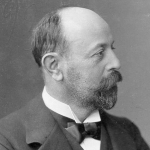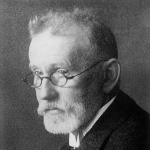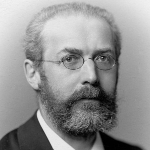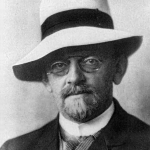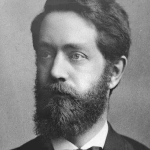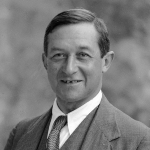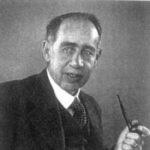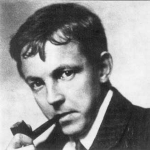Background
Edmund Landau was born on February 14, 1887, in Berlin, Germany. He was the only son of a famous gynecologist Leopold Landau and the former Johanna Jacoby.

Französische Gymnasium, Berlin, Germany
Landau attended the Französische Gymnasium in Berlin.
Humboldt University of Berlin, Berlin, Germany
Landau studied mathematics in Berlin. He worked mostly with Georg Frobenius and received his doctorate in 1899.
Edmund Landau at work.
Edmund Landau at work.
Photo of Edmund Landau.
Photo of Oswald Veblen, Edmund Landau and Harald Bohr.
German Academy of Sciences Leopoldina, Halle, Germany
Landau was a member of the German Academy of Sciences Leopoldina.
Russian Academy of Sciences, Saint Petersburg, Russia
Landau was a member of the Russian Academy of Sciences.
London Mathematical Society, London, England
Landau was an honorary member of the London Mathematical Society.


















educator mathematician scientist
Edmund Landau was born on February 14, 1887, in Berlin, Germany. He was the only son of a famous gynecologist Leopold Landau and the former Johanna Jacoby.
Landau attended the Französische Gymnasium in Berlin and then studied mathematics, primarily also in Berlin. He worked mostly with Georg Frobenius and received his doctorate in 1899. Two years later he obtained the venia legendi, entitling him to lecture.
Landau taught at the University of Berlin until 1909 and then became full professor at the University of Göttingen, succeeding Hermann Minkowski. David Hilbert and Felix Klein were his colleagues. During the 1920s, Landau was instrumental in establishing the Mathematics Institute at the nascent Hebrew University of Jerusalem. Intent on eventually settling in Jerusalem, he taught himself Hebrew and delivered a lecture entitled Solved and unsolved problems in elementary number theory in Hebrew on April 2, 1925, during the University's groundbreaking ceremonies. He negotiated with the University's president, Judah Magnes, regarding a position at the University and the building that was to house the Mathematics Institute.
Landau and his family emigrated to Mandatory Palestine in 1927, and he began teaching at the Hebrew University. The family had difficulty adjusting to the primitive living standards then available in Jerusalem. In addition, Landau became a pawn in a struggle for control of the University between Magnes and Chaim Weizmann and Albert Einstein. Magnes suggested that Landau be appointed Rector of the University, but Einstein and Weizmann supported Selig Brodetsky. Landau was disgusted by the dispute and decided to return to Göttingen, remaining there until he was forced out by the Nazi regime after the Machtergreifung in 1933. Thereafter, he lectured only outside Germany, for example, in Cambridge in 1935 and in Brussels in 1937, shortly before his sudden death.
Landau’s principal field of endeavor was analytic number theory and, in particular, the distribution of prime numbers. In 1903 he presented a new, fundamentally simpler proof, which, moreover, allowed the prime number theorem and a refinement made by de la Vallée-Poussin to be applied to the distribution of ideal primes in algebraic number fields. In his two-volume Handbuch der Lehre von der Verteilung der Primzahlen, Landau gave the first systematic presentation of analytic number theory. For decades it was indispensable in research and teaching and remains an important historical document. His three-volume Vorlesungen über Zahlentheorie provided an extremely comprehensive presentation of the various branches of number theory from its elements to the contemporary state of research.
Besides two further books on number theory, Landau was author of Darstellung und Begründung einiger neuerer Ergebnisse der Funktionentheorie, which contains a collection of interesting and elegant theorems of the theory of analytic functions of a single variable. Landau himself discovered several theorems and demonstrated others in a new and simpler fashion. In Grundlagen der Analysis he established arithmetic with whole, rational, irrational, and complex numbers, starting from Peano’s axioms for natural numbers. Also important is Einführung in die Differentialrechnung und Integralrechnung.
Edmund Landau is remembered as one of the leading German mathematicians who did important work in the theory of functions and was one of the founders of modern number theory. Through his books and his more than 250 papers Landau exercised a great influence on the whole development of number theory in his time. G. H. Hardy wrote that no one was ever more passionately devoted to mathematics than Landau.
Written with the greatest care, Landau’s books are characterized by argumentation which is complete, and as simple as possible. The necessary prerequisite knowledge is provided, and the reader is led securely, step by step, to the goal. The idea of the proof and the general relationships are, to be sure, not always clearly apparent, especially in his later works, which are written in an extremely terse manner - the so-called Landau style.
Landau was a member of several German academies, of the academies of Saint Petersburg and Rome, and an honorary member of the London Mathematical Society.
Landau was an enthusiastic teacher and sought contact with fellow scientists.
In 1905 Landau married Marianne Ehrlich, the daughter of Paul Ehrlich; they had two daughters and two sons. Their first son, Herbert, died when he was only four years old.
Harald Bohr and G. H. Hardy were often his guests in Göttingen.
